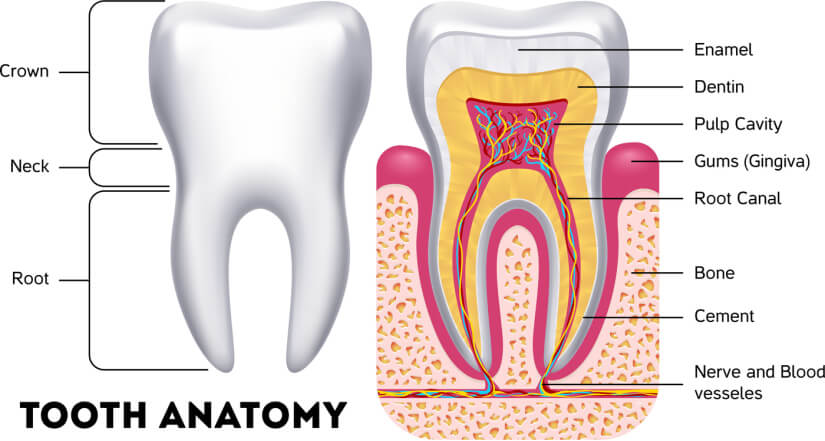Does the thought of biting into something cold or drinking a hot beverage make you wince? You aren’t alone! According to a survey published in the Journal of the American Dental Association, as many as one in eight Americans suffer from oral sensitivity.
The good news? With some TLC, regular dental visits, and proper oral hygiene, gum and/or teeth sensitivity can be treated.
Let’s start by identifying which form of sensitivity you are experiencing.
Sensitive teeth
The outermost layer on the exposed part of your teeth is the enamel. It is a hard surface which serves to protect the inner layers. Just beneath the enamel layer are the dentin layers, which are bone-like structures, made up of microscopic tubules.
When your enamel is damaged, the dentin layer is exposed, allowing hot, cold and acidic foods to stimulate the nerves and causing pain or sensitivity.
Enamel erosion causes
There are many factors that can cause enamel to erode, exposing the dentin layer and resulting in tooth sensitivity. The primary causes are abrasion due to aggressive brushing, tooth decay or gums recession.
- Tooth decay (cavities)
- Cracked teeth
- Gingivitis
- Worn fillings
- Gastric reflux (GERD)
- Gum disease
- Exposed roots
- Brushing too hard
- Gum recession
- Acidic foods
- Teeth grinding or clenching
- Plaque buildup
- Long-term use of mouthwash
If tooth sensitivity is noted primarily when chewing, the cause could be a cracked tooth. A cracked tooth is vulnerable to infection and even nerve damage, and should be repaired with a crown or bonding to avoid breakage.
Treatment of sensitive teeth
The good news is that sensitive teeth are often easily treated. Based on the cause of the sensitivity, the following treatments may be recommended:
- De-sensitizing toothpaste
- Switching to a soft bristle toothbrush
- Utilizing a daily fluoride rinse treatment at home
- Treatment of the exposed area to reduce sensitivity
- Application of a fluoride gel to strengthen enamel
- Daily flossing, to remove bacteria and reduce inflammation
- Use of a nightguard appliance to mitigate the effect of clenching or grinding teeth
- Bonding along the tooth root, at the gum line
- If necessary, referral to a periodontist for a gum graft
Gum sensitivity
Gums include the layer of soft tissue that cover the bone and surrounds the root of the tooth, protecting your teeth’s nerve endings. As you age, your gums begin to wear down and recede. This recession can leave the roots of your teeth exposed, and can also make you more vulnerable to gum disease and infections. If your teeth are suddenly more sensitive than they used to be, and eating hot or cold foods makes you cringe, gum recession could be the culprit.
For many, gum sensitivity is a mild annoyance that can be relieved somewhat easily. However, if not treated it can become a sign of a serious problem. It’s important to understand why sensitivity occurs, as well as the symptoms and treatments for soreness.
If you have sensitive gums, in addition to soreness, you may observe redness or bleeding when you brush or floss your teeth, as well as bad breath.
Treating sensitive gums
Sensitive gums are easily treated and can often be relieved at home. Some at home and over-the-counter methods are:
- Improve your dental hygiene — brush your teeth regularly and floss daily
- Use antiseptic mouthwash to kill the bacteria in your mouth
- Make sure you are getting enough Vitamin C
- Drink more water to help wash food and bacteria from your teeth and mouth
- Quit smoking to heal your gums
- Practice stress management to reduce teeth clenching or grinding
- Use over-the-counter medications such as Orajel, to help ease sensitivity
Sensitive teeth and/or gums can become painful if not treated. If you have tried the above recommendations and symptoms persist, you may need to see us for an evaluation to determine the cause and recommended treatment.
As always, we encourage you to maintain routine dental hygiene appointments to best manage your oral health. To schedule an appointment, please call the office at 978-664-3141, or complete the Contact form here: Contact Us

